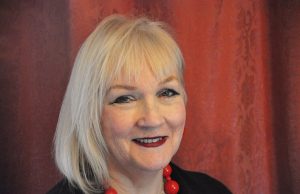- About Ramapo
- Academics
- Admissions & Aid
- Student Life
- Athletics
- Alumni
- Arts & Community
- Quick Links
- Apply
- Visit
- Give
Virtual Event: Examining the Remarkable Legacy of German Jewish Artist Charlotte Salomon
(PDF) (DOC) (JPG)March 17, 2021

Griselda Pollock
MAHWAH, N.J. – Griselda Pollock (University of Leeds, UK) will be in conversation with Kerry Wallach (Gettysburg College, PA) about the work and life of the German Jewish artist, Charlotte Salomon. The program will be delivered virtually via Zoom on Tuesday, April 20 at 2 p.m. It will be presented under the joint auspices of the Center for Holocaust and Genocide Studies the Leo Baeck Institute, New York. It will be part of the 2021 Carnegie Hall Festival, Voices of Hope, on the resilience of artists and the life-affirming power of music and the arts during times of oppression and tyranny. Center Director Michael A. Riff will act as moderator. The program is free and open to the public. Registration to attend via Zoom is at: https://www.eventbrite.com/e/a-conversation-on-artist-charlotte-salomon-tickets-132447779875?aff=ebdssbeac
Although her life was cut short when she was murdered while pregnant on arrival at Auschwitz in 1943 at the age of 26, Salomon left behind a legacy that is as beguiling as it is perplexing. It is exemplified by the 784 paintings in a variety of modes that comprise the collection, Leben? Oder Theater? (Life? Or Theater?) that she produced between 1941 and 1943 in the South of France while hoping to elude deportation.
Pollock, the author of Charlotte Salomon and the Theatre of Memory (Yale U. Press, 2018), has described Leben? Oder Theater? as “an event in the history of art,” and has sought to combine in her analysis of Salomon’s work and life insights drawn from feminist art history and Jewish studies without neglecting the subjectivity of her work or the poignancy of her story. Kerry Wallach, the author of Passing Illusions: Jewish Visibility in Weimar Germany (U. of Mich. Press, 2017), brings to the conversation insights that she has gained from her research on German-Jewish culture as well as new ones related to the preparation of the first book-length study of East European-born Jewish artist and illustrator Rahel Szalit-Marcus (1888–1942).
Born in South Africa, Griselda Pollock grew up in Canada. Moving to Britain during her teens, Pollock studied Modern History at Oxford and History of European Art at the Courtauld Institute of Art, where she received her doctorate in 1980 for a study of Vincent van Gogh and Dutch art. After teaching at Reading and Manchester universities, Pollock joined the University of Leeds in 1977 as lecturer in History of Art and Film and was appointed to a Personal Chair in Social and Critical Histories of Art in 1990. In 2001, she became Director of the Centre for Cultural Analysis, Theory and History at the University of Leeds, retiring as professor of Social and Critical Histories of Art. She was awarded an honorary doctorate by the Courtauld Institute in 2019. Pollock was named as the 2020 Holberg Prize Laureate “for her groundbreaking contributions to feminist art history and cultural studies.”

Kerry Wallach
Kerry Wallach is Associate Professor of German at Gettysburg College in Pennsylvania and a scholar of twentieth-century Germany and German-Jewish culture. She is the author of Passing Illusions: Jewish Visibility in Weimar Germany (2017) and a number of articles that deal with German-Jewish literature, history, and culture; visual and consumer culture; film; and gender. Support from Hadassah-Brandeis Institute Research Award and a Sharon Abramson Research Grant from the Holocaust Educational Foundation of Northwestern University has allowed Wallach to pursue her project on Rahel Szalit-Marcus. She serves on the Academic Advisory Board of the Leo Baeck Institute, New York, and as a series co-editor for German Jewish Cultures. She holds both an M.A. and Ph.D. from the University of Pennsylvania and B.A. from Wesleyan University.
The Leo Baeck Institute is an international research institute with independent centers in New York City, London and Jerusalem that are devoted to the study of the history and culture of German-speaking Jewry. In New York, it is one of the founding members of the Center for Jewish History.
For information or to request disability-related accommodations for this event, please contact holgen@ramapo.edu or call 201-684-7409.
###
About Ramapo College
Ramapo College of New Jersey is the state’s premier public liberal arts college and is committed to academic excellence through interdisciplinary and experiential learning, and international and intercultural understanding. The comprehensive college is situated among the beautiful Ramapo Mountains, is within commuting distance to New York City, was named one of the 50 Most Beautiful College Campuses in America by CondeNast Traveler, and boasts the best on-campus housing in New Jersey per Niche.com. Established in 1969, Ramapo College offers bachelor’s degrees in the arts, business, data science, humanities, social sciences and the sciences, as well as in professional studies, which include business, education, nursing and social work. In addition, the College offers courses leading to teacher certification at the elementary and secondary levels, and offers graduate programs leading to master’s degrees in Accounting, Applied Mathematics, Business Administration, Contemporary Instructional Design, Computer Science, Creative Music Technology, Data Science, Educational Leadership, Nursing, Social Work and Special Education, as well as a Doctor of Nursing Practice.
Press Release Archives
| 2025 | 2024 | 2023 | 2022 | 2021 | 2020 | 2019 | 2018 | 2017 | 2016 | 2015 | 2014 | 2013 | 2012 | 2011 | 2010 | 2009 | 2008 | 2007 | 2006 | 2005 | 2004 | 2003 | 2002 | 2001 | 2000 | 1999 |Copyright ©2025 Ramapo College Of New Jersey. Statements And Policies. Contact Webmaster.

Follow Ramapo